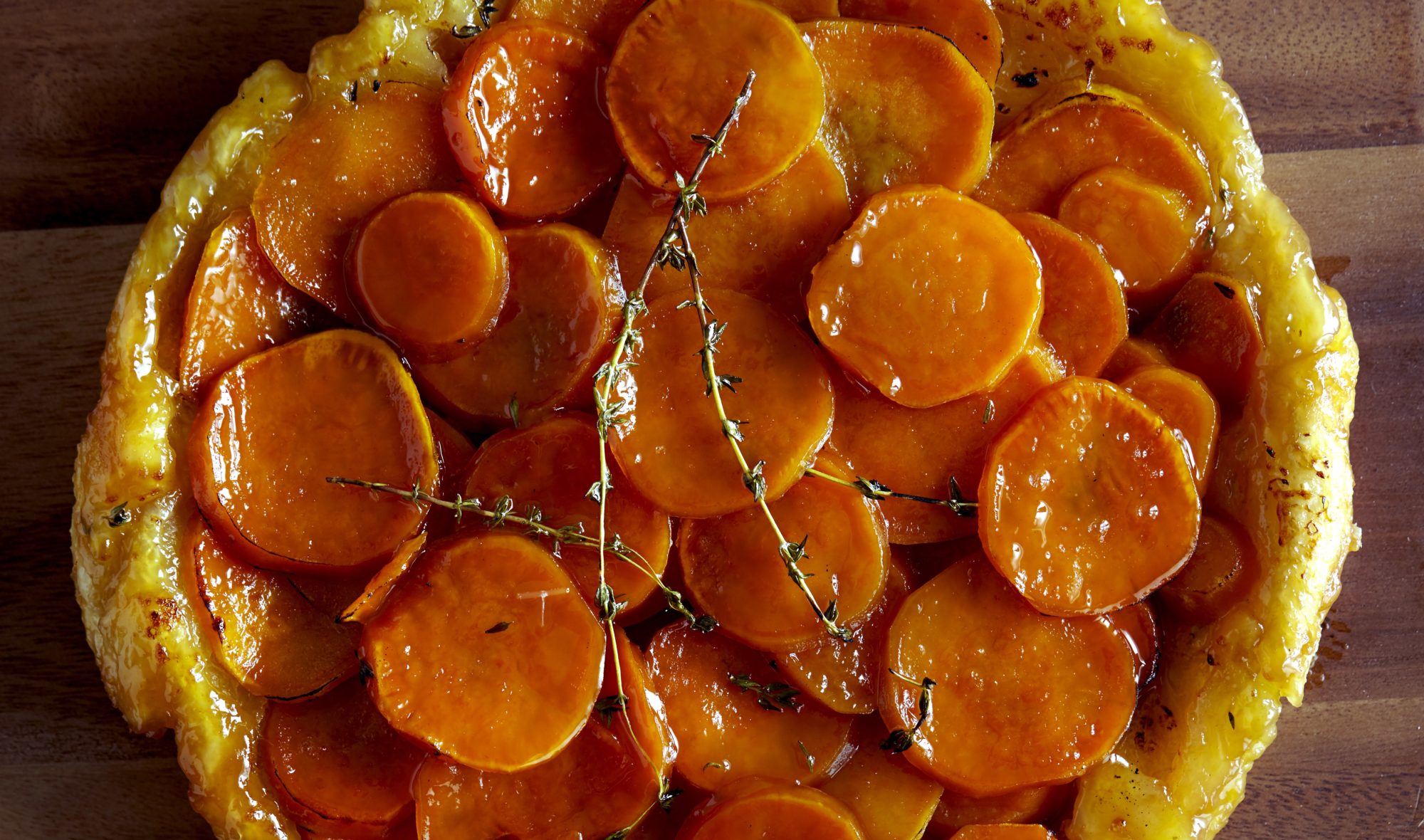Sweet Potato


Sweet potatoes are starchy tubers with orange, sweet-tasting flesh. Sweet potatoes are a good source of fiber, vitamins C and D, beta-carotene, and minerals such as iron, potassium, and magnesium. Stored properly, in a cool, dark and dry place, sweet potatoes can keep for weeks or months. Sweet potatoes can be prepared similarly to ordinary baking potatoes: they can be baked, boiled, or mashed. Because of their high sugar content, they are also excellent in baked goods or desserts.
A sweet potato is a starchy, sweet-tasting, tuberous root vegetable. Typically yellowish-orange with thin, edible skin, the sweet potato has, as the name suggests, a distinctive sweet flavor.
Sweet potatoes can be found year-round but are most seasonal (and tasty) during fall and early winter. They have a common place at Thanksgiving and Christmas holiday tables, but are also enjoyed throughout the year.
Sometimes sweet potatoes are mistakenly referred to as yams, which are actually a different vegetable altogether.
Most sweet potatoes have a yellowish-orange color, inside and out (though different varieties and colors – like purple – do exist).
Sweet potatoes are large tubers and generally oval in shape. Of course, exact size varies: some are short and plump, others are longer and thinner.
One raw, whole sweet potato (weighing about 100g) has about 86 calories, 1.6g of protein, 0.1g of fat, 20.1g of carbohydrates, 3.0g of fiber, and 4.2g of sugar.
Sweet potatoes are a great source of vitamin C, vitamin A, vitamin B6, as well as beta-carotene, iron, potassium, and magnesium.
Choose sweet potatoes that are firm (not rubbery) and without blemishes or cuts.
Sweet potatoes store well, but as usual, buying fresh is a perk: seek out sweet potatoes in fall farmers’ markets for best flavor.
Store whole sweet potatoes in a cool, dark place. Avoid anywhere with overly damp or humid conditions. Stored properly, sweet potatoes can keep for months.
Sweet potatoes can be prepared similarly to ordinary baking potatoes: they can be baked, boiled, mashed, or sliced into matchsticks, and made into fries.
They can be a good substitute for pumpkin or butternut squash, due to their sweet flavor, starchy texture, and bright orange color.
Because of their high sugar content, sweet potatoes are sometimes used in desserts or baked goods: for example, sweet potato pie is a common preparation at Thanksgiving.
How to bake a sweet potato
To bake a sweet potato, set oven to 450F. Meanwhile, clean the sweet potato well under running water, then dry well with a paper towel. Using a fork, poke holes all over the sweet potato, then place on a foil-lined baking sheet. Bake for about 30 minutes, then flip to its other side, and bake for another 30 minutes. When cooking is completed, cut the sweet potato open and prod the flesh with a fork: it should be soft and fluffy, and thoroughly cooked.

As an alternative to bread, sweet potato is a delicious and nutritious vessel for a variety of sweet or savory toppings. This is more of a “method” than a recipe - feel free to experiment with your choice of toppings, or try our ideas below!
Prep Time: 10 minutes Cook Time: 25 minutes Yield: 2-4 servings
First, cook the sweet potato “toasts”: Preheat the oven to 400 degrees Fahrenheit. Using a very sharp knife, cut sweet potato in even, lengthwise slices that are about 1/4 inch thick. (Each large sweet potato will yield between 4 and 6 slices.) Place slices in a bowl and toss with olive oil. Line a baking tray with parchment paper and arrange slices, being careful not to crowd them too much. Place the tray in the oven and bake for 15 minutes, then remove from the oven, flip the slices, and bake again for 10 minutes.
Once the “toasts” are baked, top them with your choice of ingredients.
Or try one of our versions:
Topping #1:
Ricotta & Smoked Salmon: Spread the sweet potato slice with ricotta cheese, then layer it with smoked salmon, and thinly sliced onions. Sprinkle with capers, then drizzle with olive oil. Add salt and pepper to taste.
Topping #2:
Smashed Avocado & Poached Egg: Smash up 1/2 a ripe avocado and a pinch of sea salt per slice. Layer with sliced tomatoes. Poach an egg by bringing a saucepan of water to a simmer, then carefully releasing a cracked egg into the water. Simmer the egg untouched for about 4 minutes (for a runny yolk). Remove the poached egg with a slotted spoon, then place on top of the slice. Sprinkle with fresh microgreens or chopped herbs, and salt and red chile flakes to taste.
Topping #3:
Chocolate Almond Spread with Berries: Make the chocolate almond spread by adding almond butter, maple syrup, cacao powder, and salt to a bowl and mixing until well combined. Spread a portion of this mixture onto a sweet potato slice, then top with fresh berries and chopped nuts. Drizzle with extra almond butter if desired.
Leftover cooked sweet potato slices can be stored in an airtight container in the refrigerator for up to 4 days. To reheat, sweet potato slices can actually be toasted in a toaster. Just set the toaster to high, place the slice in the slot, and toast as you would bread. When the sweet potato “toast” pops, serve with your choice of toppings!
Precision Nutrition’s Encyclopedia of Food expands every single month as we highlight new foods and showcase beautiful food photography. If you’d like to stay up to date, simply click this link. From there, we’ll send you a FREE copy of our recipe book. We’ll also let you know when new and delicious foods are added to the site.
Sweet potatoes are starchy tubers with orange, sweet-tasting flesh. Sweet potatoes are a good source of fiber, vitamins C and D, beta-carotene, and minerals such as iron, potassium, and magnesium. Stored properly, in a cool, dark and dry place, sweet potatoes can keep for weeks or months. Sweet potatoes can be prepared similarly to ordinary baking potatoes: they can be baked, boiled, or mashed. Because of their high sugar content, they are also excellent in baked goods or desserts.